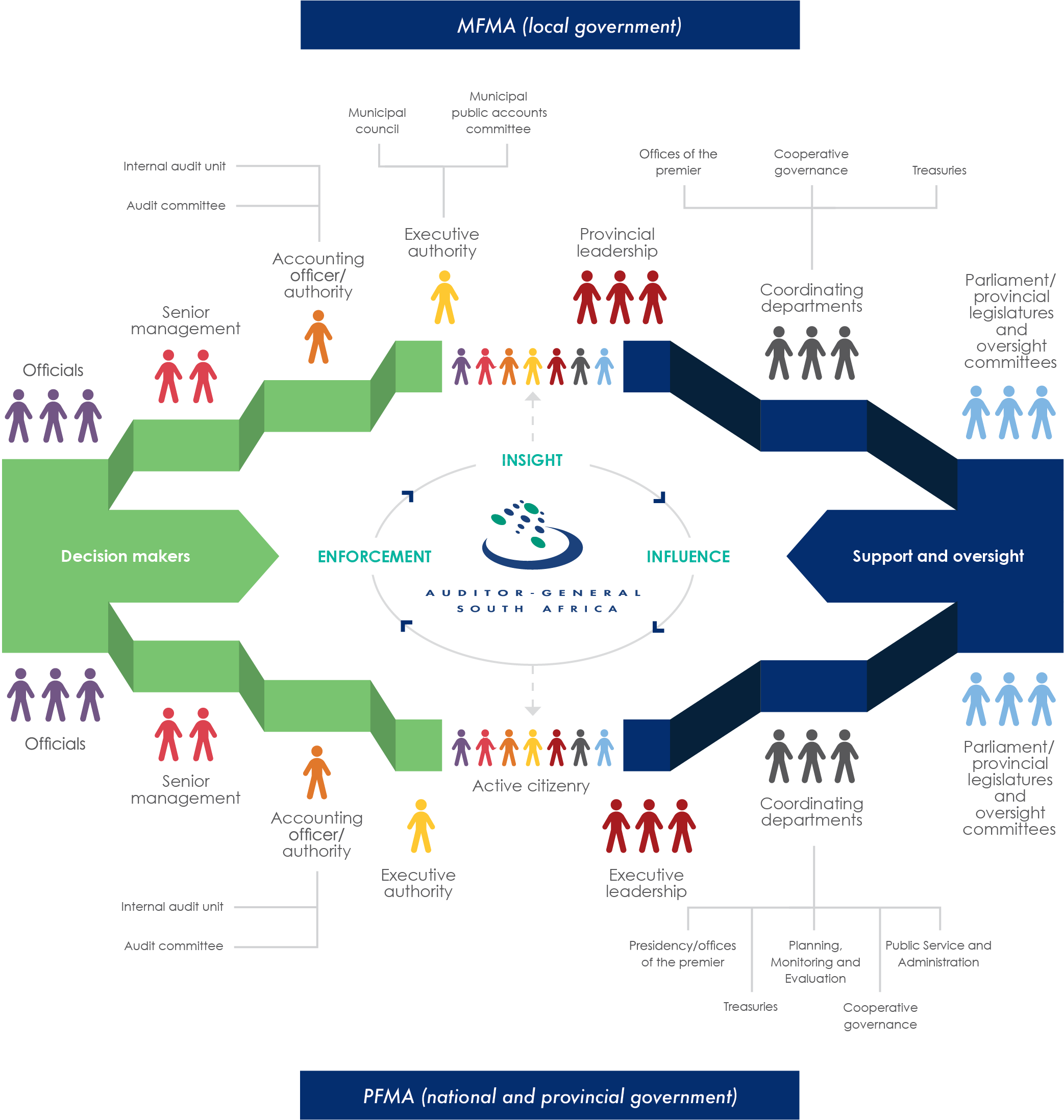Supplementary information
What is the accountability ecosystem?
The accountability ecosystem refers to the network of stakeholders that have a mandate and/or responsibility, whether legislative or moral, to drive, deepen and/or insist on public sector accountability.
We refer to this group of roleplayers as an ‘ecosystem’ because of the mutually reinforcing links between them – these stakeholders cannot simply operate within their siloes; they must work together with an awareness of how their roles influence others within the ecosystem and the ecosystem at large. If any part of the ecosystem fails to effectively play its role, this not only has a negative impact on the effectiveness of the ecosystem as a whole, it also tends to undermine the ability of other stakeholders to effectively play their roles.
What is the AGSA?
The Auditor-General of South Africa (AGSA) is a chapter 9 institution, which means its mandate and functions are outlined in chapter 9 (sections 181 & 188) of the Constitution of the Republic of South Africa. The Public Audit Act (PAA) further defines the organisation’s functions, while the amendments to the PAA expand this mandate to cover material irregularities.
Read more about our expanded mandate
What is our role in the accountability ecosystem?
As South Africa’s supreme audit institution, the AGSA is required by law to audit and report on how the government is spending the South African taxpayers’ money.
Ultimately, our role is to strengthen our country’s democracy by enabling oversight, accountability and governance in the public sector through auditing, thereby building public confidence.
Read more about our role
Active citizenry
When government spending is irregular, unauthorised or fruitless and wasteful, it is citizens’ tax money that is being misused. Active citizens take charge of their future and drive the change that they want in their communities.
If you, as a taxpaying citizen of South Africa, are unhappy with the way any government department, public or municipal entity, or municipality is spending public funds, you have the right and the power to speak up and demand accountability to ensure that public funds are used responsibly.
Read more about what you can do
Roles and responsibilities within accountability ecosystem
The mission of sustainably and efficiently shifting public sector culture through insight, influence and enforcement is broad and cannot be achieved by the AGSA alone. To within the scope of our mandate and resources, we continue to engage with the relevant roleplayers in the broader accountability ecosystem to encourage them to consistently and effectively fulfil their respective responsibilities and mandates.
By the time we report on adverse findings, multiple failures have already occurred along the accountability value chain. Once we conclude the work that falls within the scope of our mandate and resources, it is up to other roleplayers in the accountability ecosystem to do their part.

Auditor-General of South Africa
SUPREME AUDIT INSTITUTION
Responsible for:
- auditing and reporting on how government is spending the South African taxpayers’ money
Additionally, we:
engage with relevant roleplayers in the broader accountability ecosystem to encourage them to consistently and effectively fulfil their respective responsibilities and mandates
Read more about the role of the AGSA
The Municipal Finance Management Act (MFMA) and Public Finance Management Act (PFMA) set out how auditees must manage and report on their finances, and are two of the most important laws that auditees must comply with. The MFMA governs the local sphere of government, i.e. municipalities and their municipal entities, and the PFMA governs the national and provincial spheres of government, i.e. departments, state-owned enterprises, etc.

Officials and senior management (MFMA & PFMA) – includes chief financial officer, chief information officer and head of supply chain management
MANAGEMENT OR LEADERSHIP ASSURANCE
Responsible for:
- providing assurance by implementing required basic financial and performance controls
Additionally, officials and senior management should:
- ensure that the budget and performance planning processes are informed by a solid analysis and forecast, based on credible historical information and knowledge of funding constraints and with clear responses for expected performance pressures (budgets and performance plans must be carefully monitored to reduce overspending and ensure that planned targets are met)
- focus on proper infrastructure project management at an overall level and, where the monitoring process highlights any project failures and targets that are not being achieved, take corrective steps as early as possible
- ensure proper record keeping so that complete, relevant and accurate information is accessible and available to support financial and performance reporting
- implement controls over daily and monthly processing and reconciliation of transactions to track that transactions are processed accurately, completely and in good time, which will reduce errors and omissions in financial and performance reports
prepare regular, accurate and complete financial and performance reports that are supported and evidenced by reliable information
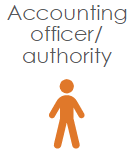
Accounting authorities (MFMA and PFMA) – boards, chief executive officers or heads of municipal or public entities
Accounting officers (MFMA and PFMA) – municipal managers, heads of departments or chief executive officers of constitutional institutions
MANAGEMENT OR LEADERSHIP ASSURANCE
Responsible for:
- creating an environment that helps improve performance management controls and enables adequate consequence management
Additionally, accounting officers and authorities should:
- ensure that monitoring controls for early detection are improved so that internal controls are adhered to, risks are managed and outcomes are achieved
- ensure that priority is given to implementing action plans that specifically address internal and external audit findings that will support financial management and governance, and for monitoring these action plans on a quarterly basis
- ensure that there are consequences for transgressions, in other words, that disciplinary steps are taken against officials who contravene the MFMA or PFMA and commit or permit unauthorised, irregular, and fruitless and wasteful expenditure
create a culture of accountability for officials who fail to comply with applicable legislation, continuously underperform or are negligent, as well as for those whose actions and decisions cause or contribute to financial losses
Internal audit units (MFMA and PFMA) – unit within the auditee established in terms of legislation
INTERNAL INDEPENDENT ASSURANCE AND OVERSIGHT
Responsible for:
helping accounting officers and authorities execute their duties by providing independent assurance on internal controls, financial information, risk management, performance management and compliance with legislation
Audit committees (MFMA & PFMA) – independent bodies, created in terms of legislation
INTERNAL INDEPENDENT ASSURANCE AND OVERSIGHT
Responsible for:
- advising accounting officer or authority, senior management and executive authorities on matters relating to financial and performance management governance
Additionally, audit committees should:
- support accounting officers and authorities in promoting accountability and service delivery by evaluating and monitoring responses to risks and overseeing the effectiveness of the internal control environment, including financial and performance reporting and compliance with legislation
- intensify their reviews of the financial statements and performance reports to prevent material misstatements in the versions submitted to us for auditing
monitor and support the resolution of material irregularities, as this will add great value to the material irregularity process
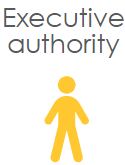
Executive authorities (MFMA and PFMA) – mayors, speakers, ministers and members of executive councils
MANAGEMENT OR LEADERSHIP ASSURANCE
Responsible for:
- monitoring and overseeing portfolios (PFMA)
- oversight, including by reviewing integrated development plan and budget management, and ensuring auditees address issues raised in audit reports (MFMA)
- improving audit outcomes by being actively involved in key governance matters and managing performance of municipal managers (MFMA)
Additionally, executive authorities should:
- ensure that they are familiar with the performance expected from accounting officers and authorities and that such performance is properly managed by holding the accounting officers and authorities accountable for the actions and decisions they take and implementing consequences for transgressions and poor performance
- ensure that accounting officers and authorities implement the recommendations of internal audit units and audit committees, and use the opportunity to interact with these bodies to help improve governance and control. They should also support the accounting officer or authority by ensuring that there is an adequately resourced and functioning internal audit unit, overseen by the audit committee that can effectively identify internal control deficiencies and recommend corrective action
- ensure that they monitor progress and support accounting officers and authorities in addressing reported material irregularities and improving controls.
Municipal councils (MFMA)– executive and legislative authority of municipality responsible for oversight and monitoring role
INTERNAL INDEPENDENT ASSURANCE AND OVERSIGHT
Responsible for:
- using reports from municipal manager and senior managers on municipality’s financial and service delivery performance
- approving or overseeing certain transactions and events
investigating and acting on poor performance and transgressions, such as financial misconduct and UIFW
Municipal public accounts committee (MFMA) – committee of municipal council established in terms of legislation
INTERNAL INDEPENDENT ASSURANCE AND OVERSIGHT
Responsible for:
- improving governance, transparency and accountability
- giving assurance to council on credibility and reliability of financial and performance reports, compliance with legislation, and internal controls
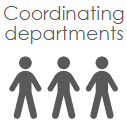
Coordinating departments (MFMA) – includes offices of the premiers, provincial treasuries and national and provincial cooperative governance departments
Coordinating departments (PFMA) – includes national and provincial treasuries, the presidency and offices of the premier; Department of Planning, Monitoring and Evaluation; national and provincial cooperative governance departments; and Department of Public Service and Administration
Play a coordinating and monitoring role as defined in legislation and in their mandates, which should contribute to the overall assurance process
EXTERNAL INDEPENDENT ASSURANCE AND OVERSIGHT
Responsible for:
- supporting and strengthening municipalities’ capacity to manage their own affairs, exercise their powers and perform their duties
Additionally, coordinating departments should:
- enforce performance measures for executive authorities and accounting officers and authorities in order to change behaviour and introduce accountability into the ecosystem (what does not get measured usually does not get done)
implement decisive coordination, monitoring and corrective action on intergovernmental systems and processes without delay to reduce extraordinarily long turnaround times on consequence management processes (such as investigations by the Special Investigating Unit, prosecution by the National Prosecuting Authority, debt recovery by the State Attorney, etc.)
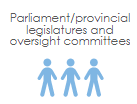
Parliament/provincial legislatures and oversight committees (MFMA & PFMA) – Parliament, provincial legislatures and committees established in line with rules of these institutions
EXTERNAL INDEPENDENT ASSURANCE AND OVERSIGHT
Responsible for:
- overseeing executive authorities
assessing strategic and annual performance plans of auditees

Active citizenry – South African citizens
Responsible for:
- playing an active part in building and shaping the country they would like to live in
Read more about what you, as a citizen, can do
Other pages in this section:
Other pages in this section:

